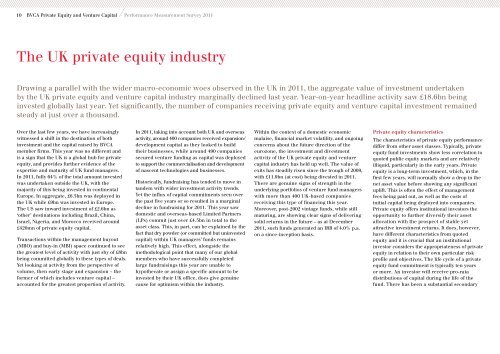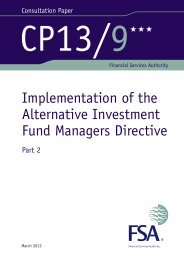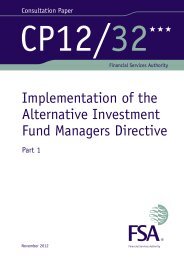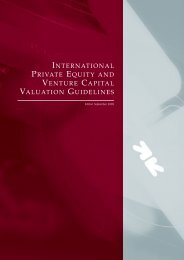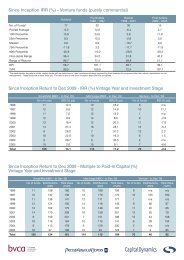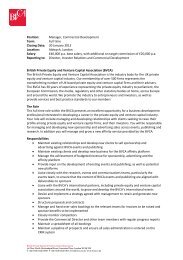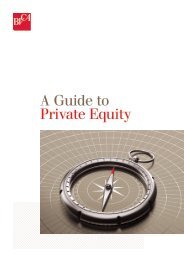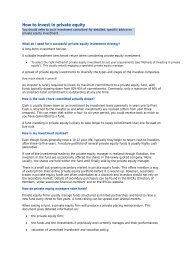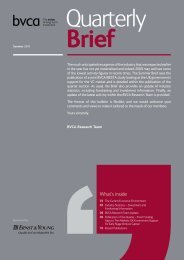BVCA Private Equity and Venture Capital ... - BVCA admin
BVCA Private Equity and Venture Capital ... - BVCA admin
BVCA Private Equity and Venture Capital ... - BVCA admin
Create successful ePaper yourself
Turn your PDF publications into a flip-book with our unique Google optimized e-Paper software.
10 <strong>BVCA</strong> <strong>Private</strong> <strong>Equity</strong> <strong>and</strong> <strong>Venture</strong> <strong>Capital</strong> Performance Measurement Survey 2011<br />
The UK private equity industry<br />
Drawing a parallel with the wider macro-economic woes observed in the UK in 2011, the aggregate value of investment undertaken<br />
by the UK private equity <strong>and</strong> venture capital industry marginally declined last year. Year-on-year headline activity saw £18.6bn being<br />
invested globally last year. Yet significantly, the number of companies receiving private equity <strong>and</strong> venture capital investment remained<br />
steady at just over a thous<strong>and</strong>.<br />
Over the last few years, we have increasingly<br />
witnessed a shift in the destination of both<br />
investment <strong>and</strong> the capital raised by <strong>BVCA</strong><br />
member firms. This year was no different <strong>and</strong><br />
is a sign that the UK is a global hub for private<br />
equity, <strong>and</strong> provides further evidence of the<br />
expertise <strong>and</strong> maturity of UK fund managers.<br />
In 2011, fully 64% of the total amount invested<br />
was undertaken outside the UK, with the<br />
majority of this being invested in continental<br />
Europe. In aggregate, £6.5bn was deployed in<br />
the UK while £9bn was invested in Europe.<br />
The US saw inward investment of £2.6bn as<br />
‘other’ destinations including Brazil, China,<br />
Israel, Nigeria, <strong>and</strong> Morocco received around<br />
£420mn of private equity capital.<br />
Transactions within the management buyout<br />
(MBO) <strong>and</strong> buy-in (MBI) space continued to see<br />
the greatest level of activity with just shy of £8bn<br />
being committed globally to these types of deals.<br />
Yet looking at activity from the perspective of<br />
volume, then early stage <strong>and</strong> expansion – the<br />
former of which includes venture capital –<br />
accounted for the greatest proportion of activity.<br />
In 2011, taking into account both UK <strong>and</strong> overseas<br />
activity, around 400 companies received expansion/<br />
development capital as they looked to build<br />
their businesses, while around 490 companies<br />
secured venture funding as capital was deployed<br />
to support the commercialisation <strong>and</strong> development<br />
of nascent technologies <strong>and</strong> businesses.<br />
Historically, fundraising has tended to move in<br />
t<strong>and</strong>em with wider investment activity trends.<br />
Yet the influx of capital commitments seen over<br />
the past five years or so resulted in a marginal<br />
decline in fundraising for 2011. This year saw<br />
domestic <strong>and</strong> overseas-based Limited Partners<br />
(LPs) commit just over £4.5bn in total to the<br />
asset class. This, in part, can be explained by the<br />
fact that dry powder (or committed but uninvested<br />
capital) within UK managers’ funds remains<br />
relatively high. This effect, alongside the<br />
methodological point that many of our global<br />
members who have successfully completed<br />
large fundraisings this year are unable to<br />
hypothecate or assign a specific amount to be<br />
invested by their UK office, does give genuine<br />
cause for optimism within the industry.<br />
Within the context of a domestic economic<br />
malaise, financial market volatility, <strong>and</strong> ongoing<br />
concerns about the future direction of the<br />
eurozone, the investment <strong>and</strong> divestment<br />
activity of the UK private equity <strong>and</strong> venture<br />
capital industry has held up well. The value of<br />
exits has steadily risen since the trough of 2009,<br />
with £11.9bn (at cost) being divested in 2011.<br />
There are genuine signs of strength in the<br />
underlying portfolios of venture fund managers<br />
with more than 400 UK-based companies<br />
receiving this type of financing this year.<br />
Moreover, post-2002 vintage funds, while still<br />
maturing, are showing clear signs of delivering<br />
solid returns in the future – as at December<br />
2011, such funds generated an IRR of 4.0% p.a.<br />
on a since-inception basis.<br />
<strong>Private</strong> equity characteristics<br />
The characteristics of private equity performance<br />
differ from other asset classes. Typically, private<br />
equity fund investments show less correlation to<br />
quoted public equity markets <strong>and</strong> are relatively<br />
illiquid, particularly in the early years. <strong>Private</strong><br />
equity is a long-term investment, which, in the<br />
first few years, will normally show a drop in the<br />
net asset value before showing any significant<br />
uplift. This is often the effect of management<br />
fees being paid out, as well as the costs of<br />
initial capital being deployed into companies.<br />
<strong>Private</strong> equity offers institutional investors the<br />
opportunity to further diversify their asset<br />
allocation with the prospect of stable yet<br />
attractive investment returns. It does, however,<br />
have different characteristics from quoted<br />
equity <strong>and</strong> it is crucial that an institutional<br />
investor considers the appropriateness of private<br />
equity in relation to their own particular risk<br />
profile <strong>and</strong> objectives. The life cycle of a private<br />
equity fund commitment is typically ten years<br />
or more. An investor will receive pro-rata<br />
distributions of capital during the life of the<br />
fund. There has been a substantial secondary


